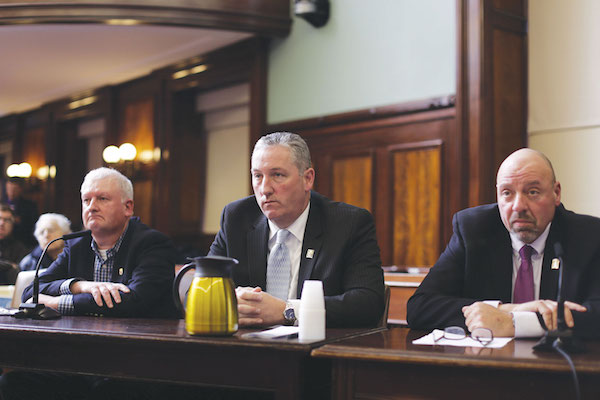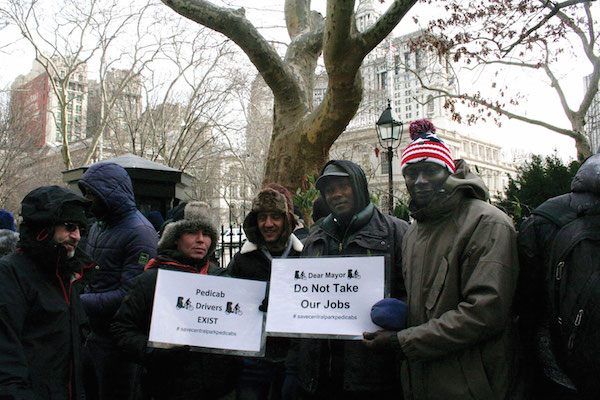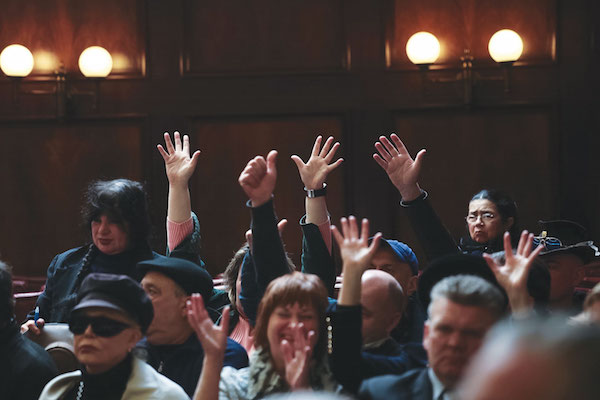
BY YANNIC RACK | Mayor Bill de Blasio, who as a candidate made political hay out of calls to scrap the city’s horse-drawn carriage industry, found his plan to relocate Hell’s Kitchen’s stables to Central Park knee-deep in muck last week.
At a hearing of the City Council’s Transportation Committee on Fri., Jan. 22, de Blasio’s representatives had a hard time answering questions surrounding the proposal, such as how much a new stable in the park would cost, where it would be located, and why it was necessary in the first place.
“I think what you’re asking us to buy here is an empty bag with a hole in it,” Queens Councilmember Barry Grodenchik said at one point during the hearing, which drew large crowds of carriage drivers, animal rights activists and pedicab operators into the council’s packed chambers at City Hall.
Most of them came to testify against the new legislation, which would reduce the number of horses licensed to operate the city’s tourist carriages from around 180 to 95 over the next three years, finally restricting an industry that the mayor had once vowed to ban altogether.
After a bill to outlaw horse-drawn carriages in the city failed to garner support last year, the mayor, together with City Council Speaker Melissa Mark-Viverito and representatives of the carriage industry, announced two weeks ago that an “agreement in concept” had been reached to curb the trade. But the details proved to be another matter altogether, raising the ire of carriage drivers, park advocates and even pedicab owners — who, under the proposal, would be barred from Central Park below 85th St.
On Friday, the councilmembers tried to mediate between the many stakeholders, though tensions ran high. The crowds, which had already been separated while queuing outside, spontaneously broke into applause and heckling, so that officials in the chamber repeatedly had to warn the audience to keep quiet.

“We are here because we care. We care for the pedicabs, we care for animal rights, we care for the jobs of the men and women who work in the carriage industry,” Committee Chair and Upper Manhattan councilmember Ydanis Rodriguez, a sponsor of the bill, said at the start of the hearing. “We want to come up with something that will work for everyone.”
Despite such noble and plentiful goals, the discussion quickly descended into a frustrating routine, as the councilmembers struggled to get a clear picture of the bill they were supposed to consider.
“The administration did a piss-poor job today of explaining their case and defending this legislation,” said Council Majority Leader Jimmy Van Bramer, of Queens.
“I have to say I came in with a very open mind. But I am more angry than ever because it is wrong to ask councilmembers to take a vote like this when no information is known, too many questions are unanswered, and all this is based on a premise that’s not backed,” he added.
In addition to restricting the number of horses starting this Dec., the bill would also cap each of the city’s 68 licensed carriages to one nine-hour shift per day, and ban rides anywhere except for the park.
“Limiting the operation of horse-drawn carriages to Central Park will eliminate the potential for dangerous interactions between horses and vehicles” on busy Midtown streets, Mindy Tarlow, director of the Mayor’s Office of Operations, told the council members.
But when pressed for details, Tarlow and her team of city officials sent to present the proposal largely stayed vague.
They could not say how much time horse carriages currently spend on city streets, or how many carriage drivers would lose their jobs under the plan. When asked how many horses had been killed in traffic in recent years, the answer was none (although four have been injured).
The proposed location for the new stable lies on the 85th Street Transverse and is currently being used for park maintenance — but Tarlow couldn’t commit to the stable ultimately being built there, and didn’t say how much its renovation would cost.
Pressed by the councilmembers, she did promise that it would not take up any public space.
“The goal is to have no impact on recreational use,” she said. “We will not take up any precious park space.”
[Editor’s note: Capital New York this week reported that the de Blasio administration has now circulated a fact sheet responding to some of the councilmembers’ questions and concerns. According to the news website, the memo said the stable will be built within a current park structure near the 85th Street Traverse, with a building housing the carriages to be constructed next to that. The administration estimated that 40 to 50 carriage industry jobs would be lost, and it defended the decision to ban pedicabs in the lower section of the park. ]
Nevertheless, the plan didn’t go down so well with park advocates.
Tupper Thomas, executive director of the nonprofit New Yorkers for Parks and a former longtime senior city Parks official, questioned the impact the stable would have on parkgoers, and criticized the investment of public dollars in the project — which is expected to cost at least $25 million.
“Parks are not just vacant, city-owned property. They belong to the public,” Thomas said.
“The city needs to give this proposal a much more careful analysis, and New Yorkers need to be able to ask questions.”
The sentiment was echoed by pedicab operators, who turned out in droves to protest the proposal (in total, over 100 members of the public signed up to testify at the hearing). Even though they were not part of the discussions for the deal, the bill includes a ban on pedicabs in the park below 85th St. — which drivers say will put them out of business.

“It just came out of nowhere, out of left field,” Frankie Legarreta, who has been driving a pedicab in the park for six years, said before the hearing, as he queued outside.
“We don’t even know why we’re a part of this bill. As far as common interest for the public goes, we are definitely a plus,” he said.
Asked about that part of the bill, Tarlow told the councilmembers that it was “appropriate.” She said the administration believed the deal was balanced and would not reduce business for any of the stakeholders involved.
At one point, members of several animal rights advocacy groups left to rally for the bill outside, on the steps of City Hall. Groups including the ASPCA, PETA and The Humane Society support the legislation, as does New Yorkers for Clean, Livable and Safe Streets (NYCLASS), which lobbied for a ban of the carriage industry during the race for mayor (and made significant donations to de Blasio’s campaign).
The group came out strongly in favor of the compromise only a day after expressing lukewarm approval, saying that the bill did “not go far enough” in protecting the animals.
“Our commitment to this cause has always been and will always be driven by our goal of protecting the well-being of carriage horses,” Allie Taylor, the organization’s executive director, said at the hearing.
As for the carriage drivers themselves, many of them testified against the bill, arguing that scaling back the number of horses — which would be reduced to 110 by this June and to 95 by the time the stable is built — as well as limiting their shifts to one per day, would spell their demise.
“We are not against the idea of the stables in Central Park, but we are against the timeline,” said Conor McHugh, a carriage owner and manager of Clinton Park Stables on W. 52nd St.
“This bill, in its current form, is effectively a carriage ban. It will bankrupt the industry, and we will be gone before we ever get the chance to move into the park,” said carriage driver Josh Sausville, who came to testify in the same gray overcoat and black top hat that he wears on his tours through the park.
“This is just trying to put us out of business,” he added.
Many of the councilmembers agreed.
“These are men and women’s livelihoods that we are asking to disrupt,” said Queens councilmember Costa Constantinides. “Why are we asking them to take a huge leap of faith if we’re not able to guarantee anything yet?
“This could potentially be a death by a thousand paper cuts,” he added.
Demos Demopoulos, secretary-treasurer of the Teamsters union, which represents the carriage drivers, said that they were still trying to negotiate a favorable deal with the administration, to preserve as many jobs as possible.
The earliest date for a vote on the bill is at the next full meeting of the Council, on Feb. 3. With the amount of unanswered questions raised at the hearing, however, the issue might still stick around for a little longer.




































